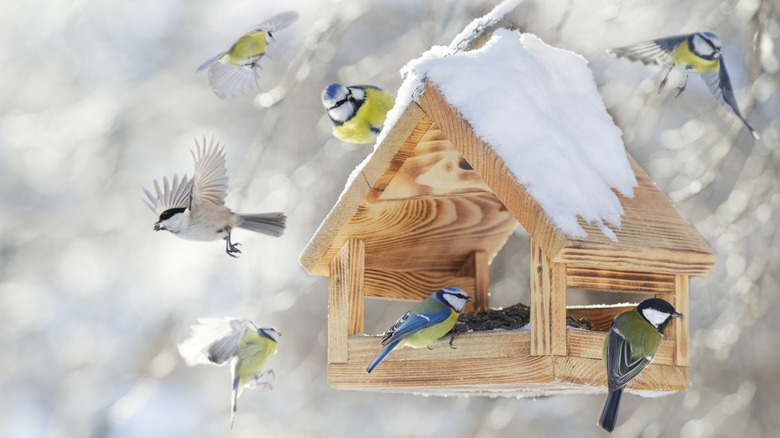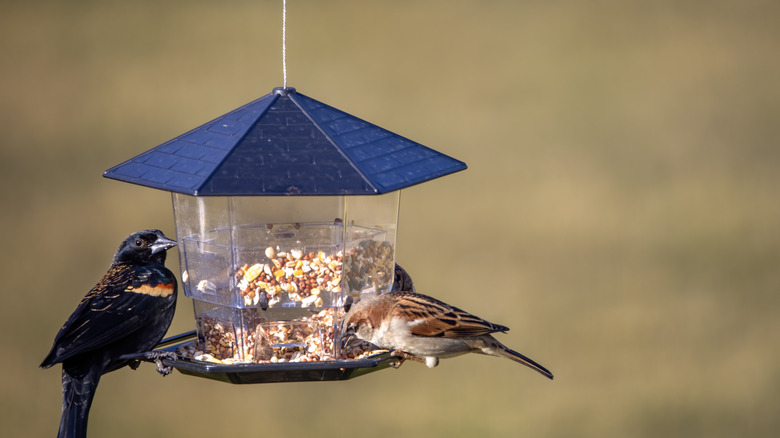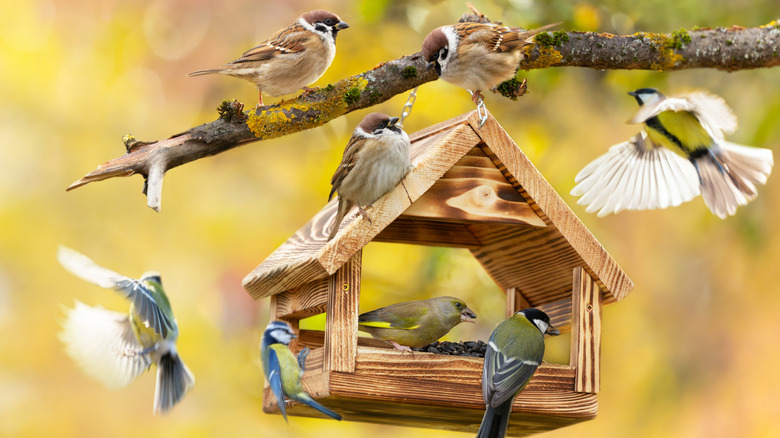Avoid These Ingredients In Bird Seed To Get More Variety At Your Feeder
We may receive a commission on purchases made from links.
As a bird lover, when you put out seed, you likely expect a flurry of feathered friends to visit. However, you might not see them flocking to your feeder, which can be disheartening. Why are they avoiding it? One cause may be the ingredients in your store-bought seed mix. Many mixed commercial bird seed options rely heavily on livestock feed fillers such as cracked corn and red milo (sorghum) as low cost alternatives to sunflower seeds or Nyjer. Not feeding birds their preferred foods can be one of the big mistakes you're making with your bird feeder. While you may think you're getting a bargain jumbo seed bag, birds might avoid it, making the cheap price not worth the money.
Most backyard birds, such as songbirds and others you may want as visitors, aren't fans of these ingredients. They often only eat it if there's nothing else available. Therefore, if you'd like to see titmice, finches, or chickadees, you must offer them better food options. Those that prefer cracked corn and red milo are ground feeders and larger birds you don't want to see in your yard, such as house sparrows and mourning doves. These "bullies" are aggressive towards other birds and may chase them away.
Why birds hate red milo and cracked corn
Both of these ingredients offer less nutrition than other foods, but they are often included to add more heft. Red milo has less protein than cracked corn, and it also isn't easy to digest. Because of this, birds often prefer the more filling, easier-to-eat foods. If left behind in your feeder, the red milo might even mold, which can sicken birds. There are some species, such as cardinals, that will eat cracked corn when offered, but smaller birds may find it difficult to eat with their tiny beaks. In addition, letting it sit for more than a day or two can be a mistake when adding corn to your feeder, as you risk the development of aflatoxins from the Aspergillus fungus if the corn gets moldy. Aflatoxins are a serious risk to birds and other animals, capable of causing internal bleeding or even death.
Using these ingredients in your feeder can often lead to waste. Birds often either ignore it completely or discard piles of feed on the ground after they pick through the mix. Piles of rejected food may then attract pests as well as rodents to your yard.
Better alternatives for your bird feeder
Luckily, there are plenty of foods that many birds will love, and their inclusion can help bring variety to your yard. You should incorporate mixes that mainly include sunflower seed, black-oil sunflower seed, and white proso millet. In addition, rather than buying a mix, you can offer hulled sunflower seeds, which are preferred by various bird species. The hulled sunflower seeds mean they don't have to waste time trying to crack the shell, so you won't have leftover shells littering the ground. There are many packaged seed mixes filled with protein-rich options for songbirds. One option is the Lyric Finch Small Songbird Wild Bird Seed, which includes canary seed, Nyjer seed, and sunflower kernels.
Instead of seeds, you could also create a buffet of various nutritious options. For instance, you could put out store-bought suet cakes, which offer good energy when food is more scarce in the winter. Fruit, such as cut oranges, organic grapes, and raisins, can also be delicious additions, as can peanuts without their shell. Mealworms are another bird favorite, though if you're squeamish, you might want to go for the dried versions. No matter what you decide to offer, ensure you clean your bird feeder every two weeks, or sooner if you see signs of mold or buildup, to prevent disease.


